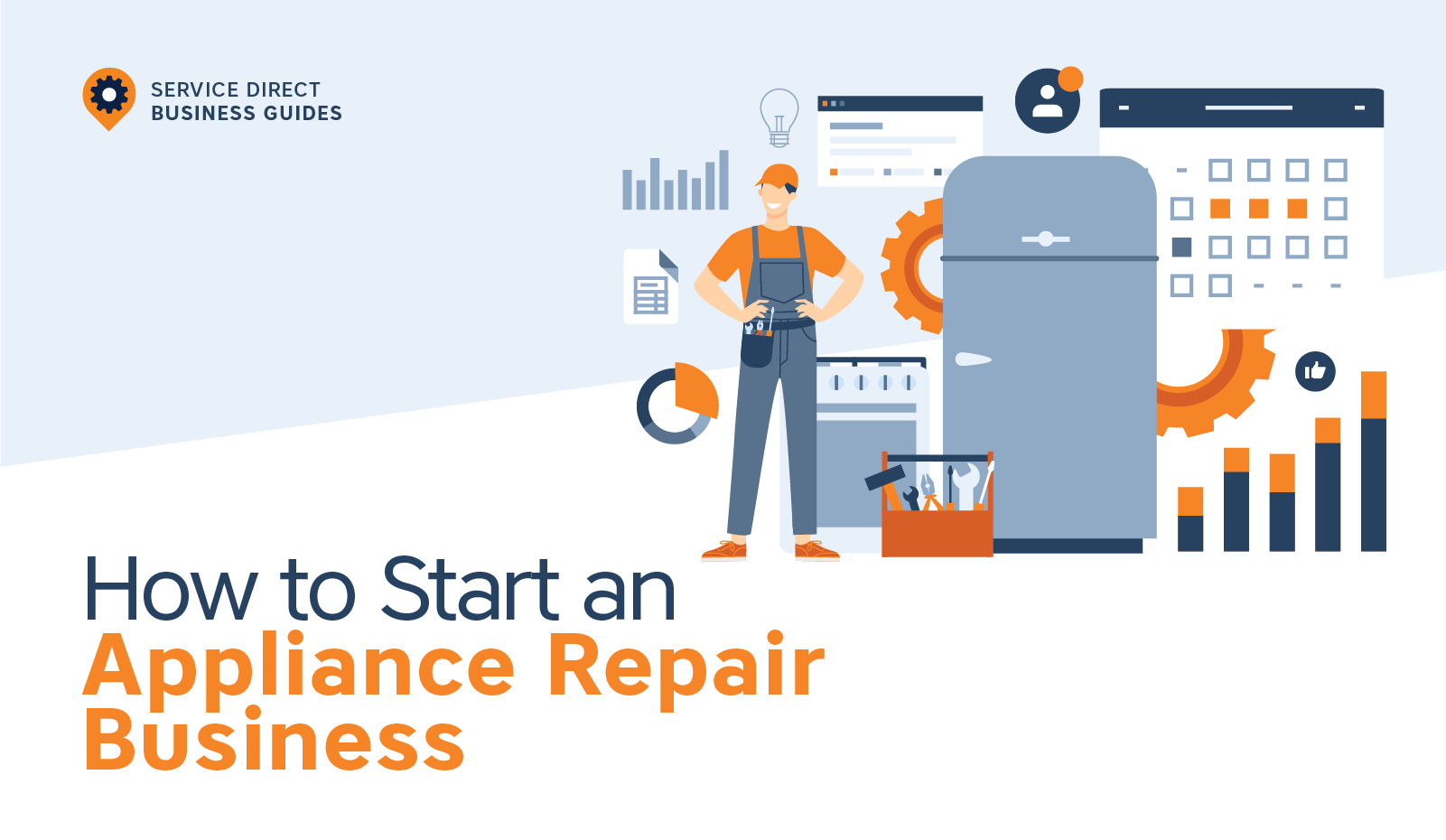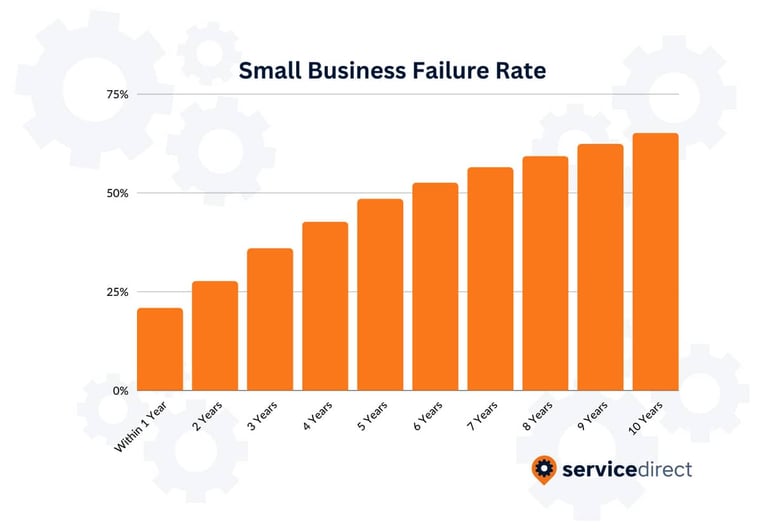How to Start an Appliance Repair Business
Starting an appliance repair business can be a rewarding and profitable venture for those with technical skills and an entrepreneurial spirit. Plus, we all use our appliances on a daily basis and if something goes wrong, an appliance repair specialist is often the only safe way to set things right! In other words, a good appliance repair company is fairly recession-proof.
This guide will provide you with essential insights and actionable steps to help you successfully launch your own appliance repair company. We’ll cover the licenses that you might need, what types of services you might offer first, and some common mistakes to avoid when starting an appliance repair business.
Whether you're a seasoned technician looking to strike out on your own or a business enthusiast exploring new opportunities, this comprehensive guide has something for everyone
Is Owning an Appliance Repair Company Profitable?
Owning an appliance repair company can indeed be a profitable endeavor. With the increasing complexity of modern appliances and the rising cost of replacing them, consumers are often inclined to repair rather than replace their malfunctioning devices.
Additionally, the demand for skilled technicians is consistently high, creating a steady stream of potential customers. However, profitability depends on various factors such as market competition, location, pricing strategy, and efficiency in running the business.
According to HomeAdvisor, the average cost of appliance repair in the United States ranges between $107 and $247 per job. This price point provides an opportunity for appliance repair businesses to generate significant revenue.
Of course, it’s important to remember that $140 is a fairly large range of potential job costs and if you are just starting out, you might not be able to charge the top level of that range. This is especially true if there are other appliance repair companies in your area that you are competing with.
Next, we'll discuss the types of appliance repair services you might offer and the range of cost for each one.
The Types of Services Appliance Repair Companies Should Offer
To cater to the diverse needs of customers and maximize your business potential, it's important to offer a comprehensive range of services. However, you also want to ensure that you are not overpromising on what you have the capacity to do as a new business.
Take a look at the following options when considering which types of services to offer:
- Appliance Diagnosis and Repair: This encompasses troubleshooting, identifying the problem, and efficiently repairing various appliances such as refrigerators, washing machines, dryers, dishwashers, ovens, and more.
- Maintenance and Preventive Services: Provide routine inspections, cleaning, and maintenance to extend the lifespan of appliances and prevent potential issues.
- Installation Services: Offer professional installation of new appliances, ensuring proper connections, adjustments, and adherence to safety guidelines.
- Parts Sales: Stock and sell commonly used appliance parts, providing customers with a convenient one-stop-shop experience.
Additionally, you’ll want to consider the potential revenue for each type of appliance repair job.
|
Appliance Type |
Price Ranges for Average Cost of Repairs |
| Garbage Disposal | $70 - $250 |
| Dryer | $100 - $400 |
| Microwave | $50 - $400 |
| Dishwasher | $50 - $500 |
| Freezer | $90 - $500 |
| Ice Maker | $90 - $250 |
| Washing Machine | $50 - $450 |
| Stove | $100 - $500 |
| Oven | $100 - $430 |
| Refrigerator | $40 - $350 |
By offering a wide array of services, you can attract a larger customer base and establish yourself as a reliable and comprehensive appliance repair provider.
Appliance Brands and Their Role in Appliance Repair
Appliance repair specialists should be prepared to service a variety of brands to cater to a wide range of customer needs.
Some of the popular appliance brands that specialists commonly work with include Samsung, LG, Whirlpool, Maytag, Kenmore, General Electric (GE), Bosch, KitchenAid, Frigidaire, and Electrolux, among others. These brands manufacture various types of appliances such as refrigerators, washing machines, dryers, dishwashers, ovens, and more.
By having expertise in repairing appliances from multiple brands, specialists can provide comprehensive services to a diverse customer base and ensure that their clients' appliances are restored to optimal functionality, regardless of the brand they own.
Researching and Obtaining Appliance Repair Licenses And More
Before starting your appliance repair business, it's crucial to research and comply with all licensing and qualification requirements in your area. Every state will have different requirements, and some cities or counties may have even further qualifications.
But, to protect your business, any employees you may have, and the customer, it’s imperative that you take care not to skip this step.
Again, these will vary depending on your location, but common prerequisites include:
- Business License: Obtain the necessary permits and licenses to operate legally within your jurisdiction.
- Insurance: Protect your business and clients by securing liability insurance coverage.
- Technician Certifications: Acquire relevant certifications, such as those offered by appliance manufacturers or industry organizations, to demonstrate your expertise and build trust with customers.
Complying with these requirements not only ensures your business operates within the legal framework but also enhances your credibility and professionalism in the eyes of potential clients.
Common Mistakes to Avoid When Starting an Appliance Repair Company
Starting any business comes with its own set of challenges. In fact, 20% of businesses fail in their first year according to the Bureau of Labor Statistics. That is a dauntingly huge number.
To set yourself up for success, and ensure that you don’t become a part of that statistic, it's important to avoid common pitfalls. Here are some mistakes to steer clear of:
Insufficient Market Research
Failing to conduct thorough market research is a common mistake that can hinder the success of your appliance repair business. Understanding the local market dynamics, including customer needs, competition, pricing strategies, and emerging trends, is crucial.
Conduct a comprehensive analysis to identify your target audience, assess the demand for repair services, and determine how to differentiate yourself from competitors. This research will inform your business strategies and help you make informed decisions.
Inadequate Financial Planning
Neglecting to develop a solid financial plan is a recipe for trouble. Many aspiring business owners underestimate the initial costs involved in starting an appliance repair company, including equipment purchases or rentals, vehicle expenses, licensing fees, insurance, marketing, and ongoing operational expenses.
Failing to budget appropriately and establish a financial cushion can lead to financial strain or even business failure. Create a detailed budget, consider potential contingencies, and develop a realistic plan for revenue generation to ensure the financial stability of your business.
Neglecting Marketing
A common mistake small business owners make is overlooking the importance of effective marketing strategies. Without a strong online presence and brand identity, it can be challenging to attract customers and stand out from competitors.
Invest in building a professional website, optimize it for SEO, and leverage social media platforms to reach and engage with your target audience. Additionally, prioritize customer service and positive customer experiences, as word-of-mouth recommendations and online reviews are powerful tools for attracting new clients.
Poor Customer Service
Providing subpar customer service or failing to address customer concerns promptly can harm your reputation and hinder the growth of your business. Remember that satisfied customers are more likely to become repeat clients and refer others to your services.
Focus on delivering exceptional service, being responsive to customer inquiries, and resolving issues in a timely and professional manner. Train your staff, if applicable, to prioritize customer satisfaction and foster positive relationships with clients.
Lack Of Technical Skills or COntinuous learning
In the appliance repair industry, technical expertise is paramount. Failing to possess the necessary skills or neglecting ongoing learning can severely impact your ability to provide quality repairs. Stay updated on the latest technologies, repair techniques, and industry advancements.
Attend training workshops, participate in online courses, and seek certifications from appliance manufacturers or professional organizations. By continuously enhancing your technical skills, you can maintain a competitive edge and deliver superior services to your customers.
Avoiding these common mistakes will increase your chances of success when starting an appliance repair business. Thorough planning, market research, financial stability, effective marketing, and a commitment to excellent customer service are key factors that can set you on the path to a thriving business.
Step-by-Step Guide to Starting an Appliance Repair Company
There are clearly plenty of factors to account for when considering starting your own appliance repair company. But once you've decided that it's what you want to do, how exactly do you go about forming and launching a business?
Here are 11 important steps to take if you want to start your appliance repair business:
- Research the local market
- Write a business plan
- Register your business
- Get your trained and certified
- Open a business bank account
- Establish a physical location
- Buy tools and equipment
- Hire a team
- Market your business
- Build a professional industry network
- Provide great customer service
Check out our detailed Step-By-Step Guide to Starting an Appliance Repair Business for a deeper look at what each of these steps entails.
Conclusion
Starting an appliance repair company can be a profitable and fulfilling venture for aspiring entrepreneurs in the service industry. By following the tips outlined in this blog and the detailed steps in our business guide, you can set yourself up for success and establish a thriving business.
While challenges may arise along the way, staying committed, adaptable, and proactive will help you navigate them and build a strong foundation for your business. A little perseverance combined with keeping a level head will help you get on top and stay there!





